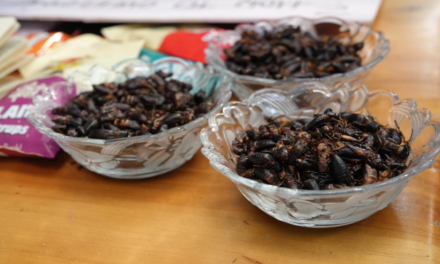
Pandemic strengthen the Kenya- telemedicine bond
By Priscilla Njambi
Jonah Mureithi had a dilemma in receiving urgent pain reliever pills for his crew, a group of stage performing artists, especially during weekends. The inconvenience was persistent until one day he discovered the M-dawa platform
“One Sunday in my day to day activities, one of our staff fell ill and we urgently needed pain killers. Most pharmaceutical shops do not operate on Sundays. I opted to make an online purchase through M-dawa, a digital platform that enables consumers to securely buy quality medicine,” said Mr Muriithi.
The checks and balances were a new and interesting experience for him.
“For the first time, I experienced a strict drug dispensing platform that does not give medicine without a doctor’s prescription unlike over the “over the counter” local pharmacies which is veered on profiteering venture that lacks keenness in patient’s welfare. The process was smooth and safe because according to my view, this restriction definitely curbs the problem of drug abuse which is rampant. Most Kenyan pharmaceuticals lack regulations and offer drugs at will,” he added.
Telemedicine, according to Centre for Disease Control and Prevention , is the use of electronic information and telecommunication technology to get access to health care services. It could be defined as sale of telemedicine services and related products through video chats, phone calls, and text messages. Telemedicine facilitates long distant patients. There is also an end to end medical consultation, online prescription for a patient’s medicine and delivery of the medicine.
For patients at home, a typical telemedicine exam involves downloading an app such as My dawa App, Afya mkononi etc. He can also call a telemedicine number, which generally is provided by a primary care physician’s office. After sharing information about medical history and symptoms, the remote patient will be connected to a clinician. Based on the clinician’s evaluation, the call will end with the patient receiving further instructions, such as to take over-the-counter medication, fill a prescription, go to a hospital or schedule a follow-up appointment.
In addition, patients can utilize the platforms for physical examinations and tabling their health concerns. Telemedicine services are offered by healthcare professionals, and exchange valid information for the diagnosis, treatment and prevention of diseases and injuries in patients where distance is an impediment. The practise has been on the rise in the country, with over 20 platforms offering health care at the click of a button. Patients can now contact their doctors virtually. The Kenya medical practitioners and Dentist Council (KMPDC) issued provisional approvals for use of telemedicine to approximately 20 registered and licensed health institutions as at February 2021.
Huawei technologies in Kenya offers advanced digital solution that aids the government to build up health data. It facilitates advanced software in health facilities thus helps in improving the efficiency of various services such as reporting, billing, staffing, managing patients and communicating with them.
This collaboration has so far benefited residents in extreme remote areas in Kenya. As a result, people no longer need to travel to distant facilities for diagnosis or treatment. Instead they can continue using their local clinic and communicate with medical specialists remotely
Among the areas that Huawei plans to explore ranges from wearable devices and wireless pill bottles, and network-enabled medical devices like stethoscopes that can transmit data directly into a patient’s electronic health record (EHR).
Like Mureithi, Faith Imani enjoyed her telemedicine experience. She fell ill on a Sunday afternoon relaxing in the house. Her blood count, according to her doctor, whom she called for a prescription, was too low. In turn, she was too sick to walk into the nearest chemist to purchase her tablets.
“I called Damapharma Chemist, and with my prescription, they sent a rider who brought the medicine at my doorstep. I would highly recommend it,” she added.
Wairimu Kimani appreciated the ease at which she was able to purchase drugs for her ailing father miles away from home.
“All I needed was the prescription and after completing the transaction on M- Dawa, I called my father telling him that someone will bring him the tablets at our home in Nakuru. By that time, I was working in neighbouring country Kampala, Uganda and was constantly worried about how my parents would get proper medical care,” she added.
Joyce Njeri, a researcher, however, expressed disappointment at the platforms, narrating her experience with M-Daktari.
“I first signed in and was told to ask a question, where a doctor will be able to answer me for free. An OTP was sent to my cell phone, after which I was asked to log in to my email. More than 48 hours later, no doctor had responded to my query. I feel this is a data mining scheme,” she quipped.
Robbin Omeka, an artist, has reservations in embracing phone applications as his clinics of choice.
“I have never thought of ordering online. I normally feel I am too sick to enjoy the convenience. I also prefer physical contact with the doctor. Basically, I am very Sceptical about change, and I am the kind of person who gets pacified when someone listens to me and diagnoses my ailment. I would only utilize such spaces if they were a precursor of a physical appointment with the doctor,” he added.
The current COVID-19 Pandemic further helped push telemedicine popularity in the country. With restricted visits to hospitals, many patients could access proper and high-quality health care with the touch of a button. Tele consultations and Tele-referrals are slowly becoming the new normal and likely to transform the whole medical terrain.
Mr Joseph Kinuthia, a nurse practitioner at the Nairobi Women Hospital and a member of Kenya Medical practitioners and Dentist council (KMPDC), emphasized that telemedicine services are “here to stay” but also acknowledges the teething problems.
“Telemedicine brings along Convenience and quick accessibility. Huge masses can be reached through tele-services by just a click of an app. Patients do not have to take time away from work for an appointment. Also, people who dwell in extreme remote areas can obtain essential health services without traveling long distances for an in-person visit.” He adds
However, the package comes not without challenges. Cyber security is a huge stumbling block. As with any technology that involves electronically transmitting data, telemedicine systems are vulnerable to online hackers and criminals. Healthcare organizations remain one of the biggest targets for online criminals and scammers.
“Ensuring patient data security is a challenge due to the vast and boundless nature of the Internet, Joseph says. We are in the early stages of telemedicine and regulating the Internet is very difficult. Nevertheless, this seems to be the new way of transacting with patients. People may be skeptical, but there is a definite shift.”
Brian, who is a gynecologist, also acknowledges that the presence of Tele services cannot be over ruled. However he is of the view that this service can only serve in less critical ailments because it is limited to consultations and online diagnosis.
“Severe health conditions which require medical procedurals such as X-rays, ultrasound, Laboratory tests, childbirth complications, surgical operations etc, require physical presence of the patien,.” he says
Growth of telemedicine in Kenya is accelerated by a high penetration of the internet. Communications Authority of Kenya data shows there are 45.4 million subscribers of wireless internet, half of them being active users. Kenya has a population of 47 million, according to the 2019 census
This work was produced as a result of grant provided by the Africa-China reporting project at the Journalism Department of the University of Witwatersrand. The opinions expressed and conclusions drawn are the authors own and do not represent those of the project.






















Recent Comments